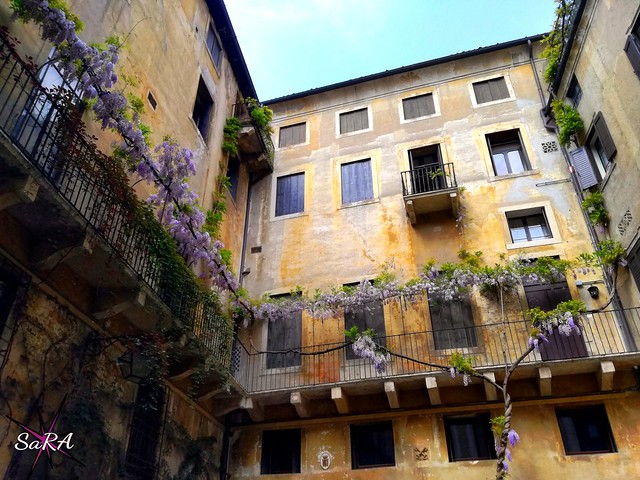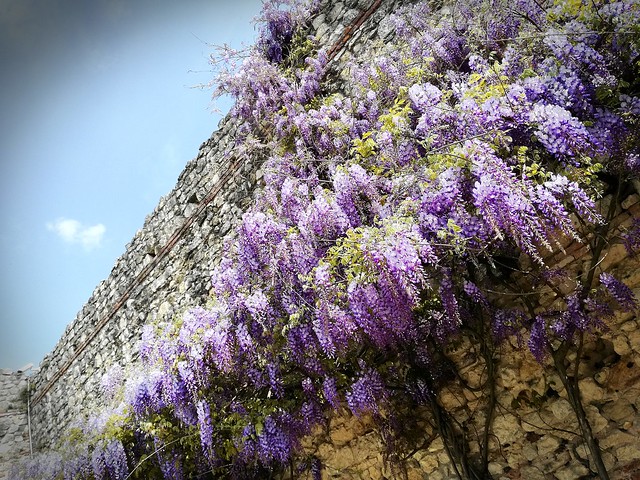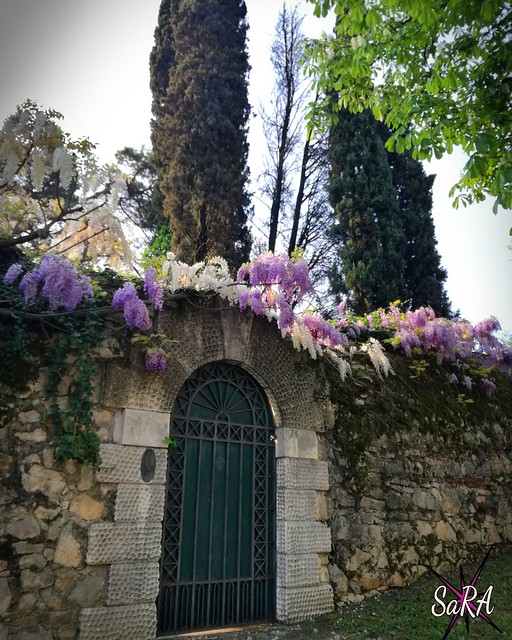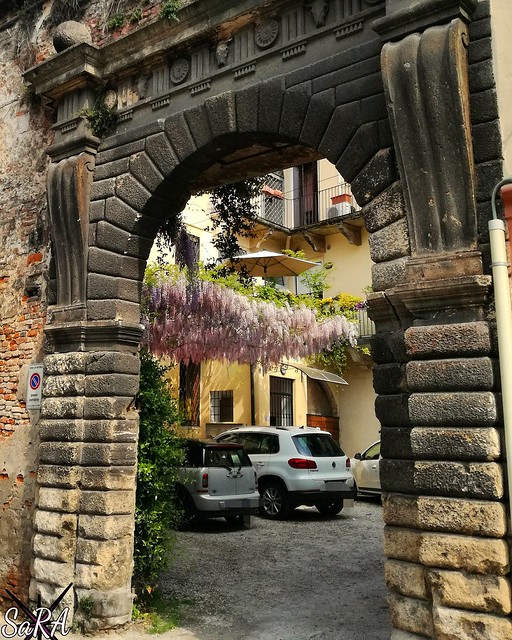It’s the wisteria season and Italians seems to love this plant very much! Check some pictures of this purple beauty and learn why wisteria creates a connection between Italy and Japan.
It’s finally the season of wisteria and here in Italy many people seem to be enamoured of those purple vines and unable to stop snatching pictures of it wherever they go. I remember that last year there was even a very successful hashtag on Instagram called #wisteriahysteria and my feed was full of magnificent purple grapes thanks to it. Well, today I was inspired to write a short poem about wisteria and, since quite a few of you, diligent Italian students, asked me to write more bilingual stuff after the Sunup-Sundown Poem, I decided to give it another go.
My aims were basically three. First, I wanted to write about the wonderful wisteria, as I said. Second, I wanted to introduce to you the Italian rhyming couplets, in our language called Rime baciate, kissed rhymes. After having read an article in which a British person complained about the difficulty of rhyming stuff in English in comparison with Italian, I wanted to show you that yes, that’s actually very true. The downside of the Italian rhymes is that you risk to sound a bit redundant and to create lame verses. It’s very easy to fall in that trap, and I hope this is not be the case. Third, one of the things I wanted to achieve with this blog was to find points in common between Italian lifestyle and other cultures in order to underline the bonds we have between Nations. God only knows how much we need this kind of dialogue nowadays.
Today it will be the turn of Japan, that, even if it has many characteristics that differ from ours, shares with us a long history and a rich culture and a particular philosophy that wants us to embrace the impermanence of life. Japanese people call it Mono no aware, and the beloved cherry trees (and especially back in the days the wisteria) are a reminder of it. For the Italians it’s the Latin motto Carpe Diem, seize the day.
As usual, you will find the cultural references in the notes at the bottom of the post. Thanks for reading.
Glicine,
forestiero compagno dall’Asia giunto
al paese del sole infine congiunto,
pare tu qui abbia trovato
eco malinconico del tuo passato. [1]
Abbracciato stretto alle nostre dimore,
rimembri i viaggi con l’imperatore?
Quando il tuo singolare aspetto
portava ai forestieri molto diletto? [2]
Mi chiedo se la tua cascata di colore
non sia in fondo un pianto di dolore,
per una patria al di là del mare
che non puoi in cuore dimenticare.
Ma poi ricordo la tua missione
che va oltre la mera ammirazione
dato che la caducità del tuo stato
invita a non dare nulla per scontato. [3]
Perciò rimiro la tua elegante presenza
e sento del Giappone la profonda essenza.
Wisteria,
foreign companion from Asia
finally joined to the Land of Sun
it seems here you’ve found
a melancholic eco of your past [1]
Tightly embraced to our dwellings,
you remind your voyages with the Emperor?
When your singular aspect
brought delight to the foreigners? [2]
I ask myself if your cascade of colour
is in reality a cry full of sorrow
for a motherland beyond the sea
that you cannot truly forget.
Then I remember your mission
that goes beyond the mere admiration
since the transience of your being
reminds us to seize the moment. [3]
Hence, I gaze at your elegant form
And I sense the essence of Japan.
Japanese Cultural References
[1] Italy is often called Il Paese del Sole, the Land of Sun. The melancholic eco of the past refers to the fact that even Japan is often nicknamed after the sun. It’s in fact called The Land of Rising Sun, as Nippon means “the sun’s origin”;
[2] According to some legends, the Emperors gifted bonsai wisteria to foreign people during their travels as a symbol of friendship;
[3] According to Buddhism Shin, wisteria is the symbol of the impermanence of life: everything transforms and you have to appreciate every single moment.
Italian References
- “Non dare nulla per scontato”: I translated this expression as “seize the moment” just for metric reasons, as it actually means “to not give anything for granted”. There’s a say in Italy that states: “Non dare mai nulla per scontato perchè niente è dovuto nella vita” (Don’t give anything for granted as you’re not entitled of anything in life”);
- The verbs rimirare and rimembrare and the nouns dimora and caducità are literary terms. They are not common in the spoken language.





Complimenti! Beautiful and very interesting about the sun and the wisteria bonsai. I’m now going to look up a few photos of that.
LikeLiked by 1 person
Thanks ❤ I looked up wisteria bonsai as well, when I read about this “legend”. So peculiar.
LikeLiked by 1 person
This is amazing Sara! Am I dreaming…? 😍😍
LikeLiked by 1 person
Wisteria flowers are dreamlike, aren’t they!? 😍❤
(I’m hopeless, I had to write to you, BUT THEN LIFE. I hope you are well 😘💕)
LikeLiked by 1 person
Life happens!! Hope you are good busy, not just headoverheelsdontknowwherelifeisleadingmebusy 😊
I noticed you changed your blog name!
LikeLiked by 1 person
Yep! I explained why here https://mydearitalia.wordpress.com/2018/05/10/new-blog-name-and-being-creative-online/
Also there was quite a funny story connected to my previous blog name. I had several visits of people who found my blog searching on google “leather jacket porn” haha 😂 It was time to change 😂😂
LikeLiked by 1 person
Lol, that’s funny. I’m not sure why they would tell you that either, must be bitterly disappointed 🙂
I’ve been thinking of changing too. Just so much effort of starting all over again!
LikeLiked by 1 person
I didn’t know that Japanese gave wisteri
LikeLiked by 1 person
Japanese and Chinese, as long as I know
LikeLike